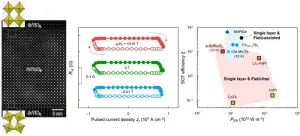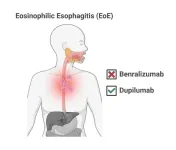(Press-News.org) Psilocybin mushrooms are the psychedelic substance most often used in the U.S., with its popularity outpacing other psychedelic drugs such as MDMA (known as ecstasy), according to a new RAND report.
Based on a new national survey, researchers found that about 12% of respondents reported using psilocybin at some point over their lives and 3.1% reported using the substance over the past year. An estimated 8 million American adults used psilocybin in 2023.
Psychedelic substances such as psilocybin mushrooms and MDMA long have been touted as holding promise for treating various mental health conditions, with enthusiasm about the substances growing during the past decade. Although clinical research continues to grow, less attention has focused on the changing policy landscape for some psychedelics.
The report, which looks broadly at emerging issues involving the use and supply of psychedelics for nonclinical purposes, suggests that as state and local officials ease regulations on the substances, federal policymakers must decide whether they want psychedelics to follow in the footsteps of the for-profit cannabis model or take another path.
“The current situation with psychedelics reminds me of where we were with cannabis policy 12 years ago” said Beau Kilmer, lead author of the report and a senior policy researcher at RAND, a nonprofit research organization. “Now is the time for federal policymakers to decide if they want to shape these policy changes or stay on the sidelines.”
Researchers caution that there is concern that if efforts to expand non-clinical supply of psychedelics do not go well, it could generate a backlash that may have a chilling effect on research and potential therapeutic uses.
“Based on what happened with clinical research on psychedelics after the 1960s, this is not an idle concern,” said Kilmer, codirector of the RAND Drug Policy Research Center.
The RAND report is based on several sources of information, including a December 2023 survey of a representative sample of 3,791 American adults who were asked about their use of a variety of substances, including psychedelics. The survey included several questions specific to psilocybin use and how it was obtained. The researchers also analyzed data from the National Survey on Drug Use and Health and the National Incident-Based Reporting System.
Researchers interviewed legal experts, policy advocates, regulators, clinical researchers, mental health providers, and representatives from organizations working in the emerging psychedelics industry for the U.S. and abroad. The work also included discussions with members of Indigenous communities about their spiritual medicines.
“Policy changes may affect Indigenous people who have longstanding traditions with certain spiritual medicines that are commonly referred to as psychedelics,” said Michelle Priest, coauthor of the report and an assistant policy researcher at RAND. “Engaging respectfully with Indigenous community members who are authorized to speak on these topics can help craft policies that benefit from generations of wisdom while protecting Indigenous rights.”
Despite the federal prohibition on supply and possession outside approved clinical research and some religious exemptions, some state and local governments are loosening their approaches to psychedelics, including approaches that legalize some forms of supply to adults for any reason.
For states considering alternatives to prohibiting the supply of psychedelics, the report highlights how there are many options besides the for-profit approach. For example, states could allow people to forage or grow their own, or allow them to join non-profit collectives or cooperatives. There also is the supervised use model that’s operating in Oregon for psilocybin and is expected to be up and running in Colorado in 2025.
One difference from cannabis policy debates, the researchers note, is the role of supervision in policy discussions surrounding psychedelics. Even in places that do not adopt the supervision model being implemented in Oregon and Colorado, policymakers will likely confront many decisions surrounding the regulation of facilitators and supervision settings.
The RAND report found that unlike people who use cannabis and many other drugs, those who use psychedelics typically do so infrequently. The RAND survey found that 0.9% of respondents reported using psilocybin during the past month, compared to 20% of respondents reporting cannabis use during the past month.
Researchers estimate that among all American adults, the total number of use days in the past month for cannabis was on the order of 650 million, whereas the comparable figure for hallucinogens was closer to 7 million.
Among those reporting past year use of psilocybin in the RAND survey, 47% reported microdosing the last time they used. Microdosing involves using small amounts of psilocybin or other psychedelics -- often 1/10th to 1/20th of a typical dose.
Researchers say one takeaway from the analysis is the extent to which infrequent users drive the market for psychedelics. For cannabis, the market for infrequent users is negligible, accounting for about 5% of the total use days in the past month. For psychedelics, that figure is closer to 60%.
“While price is a major policy lever when we think about regulating cannabis and alcohol, it will likely play a much smaller role for psychedelics since infrequent users currently drive the market and they tend to spend relatively little on these substances,” said Rajeev Ramchand, coauthor of the report and codirector of the RAND Epstein Family Veterans Policy Research Institute.
The researchers found that when they were writing the report, it became clear how little has been published about the markets and patterns of use for many psychedelics -- especially psilocybin. They offer ideas for improving existing surveys such as the National Survey on Drug Use and Health, and recommend conducting qualitative research (ideally longitudinally) with those who use psychedelics and those who produce and distribute these substances in legal or illegal settings.
Support for the study was provided by a gift to RAND from the Sergey Brin Family Foundation and internal RAND support.
Other authors of the study are Rhianna C. Rogers, Ben Senator and Keytin Palmer.
The RAND Social and Economic Well-Being division seeks to actively improve the health, and social and economic well-being of populations and communities throughout the world.
RAND Health Care promotes healthier societies by improving health care systems in the United States and other countries.
END
Magic mushrooms are the most-used psychedelic drug
As states change laws, federal policymakers face urgent questions
2024-06-27
ELSE PRESS RELEASES FROM THIS DATE:
Diagnostic stewardship approach to C. diff reduces unnecessary testing
2024-06-27
Arlington, Va. — June 27, 2024 — A new study published today in the American Journal of Infection Control (AJIC) describes the outcome of a new approach to testing for Clostridioides difficile (C. diff) guided by the principles of diagnostic stewardship. At Memorial Healthcare System in Hollywood, Fla., revised rules for when C. diff tests could be ordered helped to reduce inappropriate testing by 20%, which in turn can help rein in the overtreatment of patients.
C. diff is a common and potentially dangerous gastrointestinal pathogen, often linked to healthcare-associated infections ...
Materials research revolutionized by a small change
2024-06-27
Like the flutter of a butterfly's wings, sometimes small and minute changes can lead to big and unexpected results and changes in our lives. Recently, a team of researchers at Pohang University of Science and Technology (POSTECH) made a very small change to develop a material called “spin-orbit torque (SOT),” which is a hot topic in next-generation DRAM memory.
This research team, led by Professor Daesu Lee and Yongjoo Jo, a PhD candidate, from the Department of Physics and Professor Si-Young ...
How scientists build rotatory machines with molecules
2024-06-27
Machines have evolved to meet the demands of daily life and industrial use, with molecular-scale devices often exhibiting improved functionalities and mechanical movements. However, mastering the control of mechanics within solid-state molecular structures remains a significant challenge.
Researchers at Ulsan National Institute of Science and Technology (UNIST), South Korea have made a groundbreaking discovery that could pave the way for revolutionary advancements in data storage and beyond. Led by Professor Wonyoung Choe in the Department of Chemistry at UNIST), a team of scientists has developed zeolitic imidazolate frameworks (ZIFs) that mimic intricate machines. These molecular-scale ...
Two studies show mixed progress against EoE
2024-06-27
Despite high hopes, a drug that wipes out the namesake cell type associated with the disease eosinophilic esophagitis (EoE) doesn’t make patients feel better and doesn’t reverse tissue damage in their throats.
Meanwhile, data show that a different drug that had previously been approved for use in adults and teens with EoE is also safe and effective for children under 12 who weigh at least 15 kg (about 33 pounds).
The results of these clinical trials—plus an accompanying editorial—appear in the June 17, 2024, edition of The New England Journal of Medicine.
“Together, these ...
Why the harsh Snowball Earth kick-started our earliest multicellular ancestors: new study
2024-06-27
For a billion years, single-celled eukaryotes ruled the planet. Then around 700 million years ago during Snowball Earth — a geologic era when glaciers may have stretched as far as the Equator — a new creature burst into existence: the multicellular organism.
Why did multicellularity arise? Solving that mystery may help pinpoint life on other planets and explain the vast diversity and complexity seen on Earth today, from sea sponges to redwoods to human society.
Common wisdom holds that oxygen levels had to hit a certain threshold ...
Bin Wang receives Friedrich Wilhelm Bessel Research Award
2024-06-27
NORMAN, OKLA. – Bin Wang, a professor in the School of Sustainable Chemical, Biological and Materials Engineering at the University of Oklahoma, has received a Friedrich Wilhelm Bessel Research Award from the Alexander von Humboldt Foundation. Wang was selected for his contributions to computational catalysis and physical chemistry.
The Bessel Award is funded by the German Federal Ministry of Education and Research to foster collaborative relationships between international academics and German researchers. The award ...
Decline in UK coronary heart disease rates offset by rise in other cardiovascular conditions
2024-06-27
Rates of coronary heart disease in the UK have declined by about 30% over the past two decades, but this has been offset by rising rates of other conditions affecting the heart or blood vessels, finds a study in The BMJ today.
What’s more, improvements in rates of coronary heart disease almost exclusively appeared to benefit the over 60s, with little or no improvement in younger or more deprived groups, the results show.
As such, the researchers say future prevention strategies might need to consider a broader spectrum ...
Specialist weight-loss services in England unable to keep up with spiralling demand
2024-06-27
One in six integrated care boards (ICBs) in England have stopped accepting new patients for specialist weight management services as their referral numbers spiral out of control, an investigation by The BMJ has found.
ICBs are responsible for planning health services for their local population. At least seven out of 42 ICBs across the country - covering Manchester, Bristol, Suffolk, Leicester, Essex, and much of Yorkshire - have had to close a specialist (tier 3) weight management service list in their area, with many warning that demand is far exceeding capacity, reports Elisabeth Mahase.
Experts have said the rise in obesity and the demand for weight-loss injections may be fuelling ...
Cardiovascular health could be biggest risk factor for future dementia rates
2024-06-27
Dementia risk factors associated with cardiovascular health may have increased over time compared to factors such as smoking and having less education, finds a new study led by UCL researchers.
The study, published in The Lancet Public Health, explored how the prevalence of dementia risk factors had changed over time and how this could impact rates of dementia in the future.
It is estimated that there are currently 944,000 people living with dementia in the UK and 52% of the UK public – 34.5 million ...
New study shows alcohol rehabilitation and abstinence reduce the risk of alcohol-associated cancers
2024-06-27
June 26, 2024 (Toronto, Canada) – A new study conducted by the Centre for Addiction and Mental Health (CAMH), Bordeaux University Hospital, France, and the World Health Organization (WHO) has found that individuals with alcohol dependence who undergo rehabilitation or maintain abstinence experience significantly lower risks of developing alcohol-associated cancers. The article, entitled Alcohol rehabilitation and cancer risk: a nationwide hospital cohort study in France was published today in Lancet Public Health. It is the largest of its kind to provide evidence linking reduced ...
LAST 30 PRESS RELEASES:
New knowledge on heritability paves the way for better treatment of people with chronic inflammatory bowel disease
Under the Lens: Microbiologists Nicola Holden and Gil Domingue weigh in on the raw milk debate
Science reveals why you can’t resist a snack – even when you’re full
Kidney cancer study finds belzutifan plus pembrolizumab post-surgery helps patients at high risk for relapse stay cancer-free longer
Alkali cation effects in electrochemical carbon dioxide reduction
Test platforms for charging wireless cars now fit on a bench
$3 million NIH grant funds national study of Medicare Advantage’s benefit expansion into social supports
Amplified Sciences achieves CAP accreditation for cutting-edge diagnostic lab
Fred Hutch announces 12 recipients of the annual Harold M. Weintraub Graduate Student Award
Native forest litter helps rebuild soil life in post-mining landscapes
Mountain soils in arid regions may emit more greenhouse gas as climate shifts, new study finds
Pairing biochar with other soil amendments could unlock stronger gains in soil health
Why do we get a skip in our step when we’re happy? Thank dopamine
UC Irvine scientists uncover cellular mechanism behind muscle repair
Platform to map living brain noninvasively takes next big step
Stress-testing the Cascadia Subduction Zone reveals variability that could impact how earthquakes spread
We may be underestimating the true carbon cost of northern wildfires
Blood test predicts which bladder cancer patients may safely skip surgery
Kennesaw State's Vijay Anand honored as National Academy of Inventors Senior Member
Recovery from whaling reveals the role of age in Humpback reproduction
Can the canny tick help prevent disease like MS and cancer?
Newcomer children show lower rates of emergency department use for non‑urgent conditions, study finds
Cognitive and neuropsychiatric function in former American football players
From trash to climate tech: rubber gloves find new life as carbon capturers materials
A step towards needed treatments for hantaviruses in new molecular map
Boys are more motivated, while girls are more compassionate?
Study identifies opposing roles for IL6 and IL6R in long-term mortality
AI accurately spots medical disorder from privacy-conscious hand images
Transient Pauli blocking for broadband ultrafast optical switching
Political polarization can spur CO2 emissions, stymie climate action
[Press-News.org] Magic mushrooms are the most-used psychedelic drugAs states change laws, federal policymakers face urgent questions



